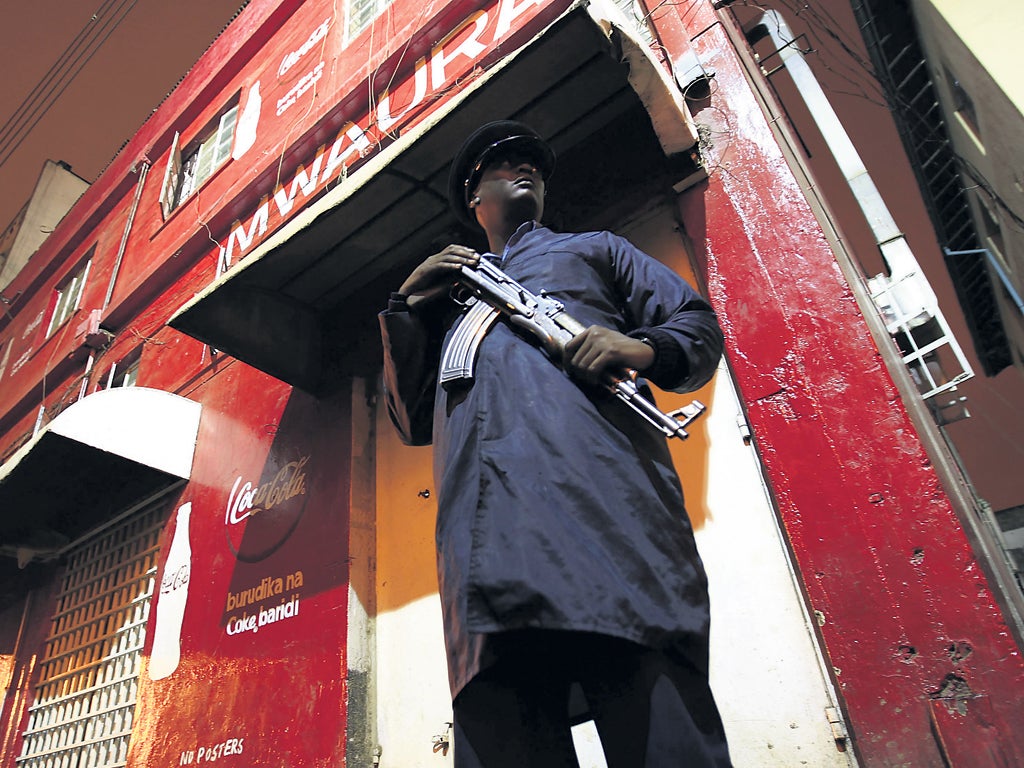Somali invasion backed by West, says Kenya
Grenade attack on Nairobi nightclub blamed on backlash by Somali militants

Your support helps us to tell the story
From reproductive rights to climate change to Big Tech, The Independent is on the ground when the story is developing. Whether it's investigating the financials of Elon Musk's pro-Trump PAC or producing our latest documentary, 'The A Word', which shines a light on the American women fighting for reproductive rights, we know how important it is to parse out the facts from the messaging.
At such a critical moment in US history, we need reporters on the ground. Your donation allows us to keep sending journalists to speak to both sides of the story.
The Independent is trusted by Americans across the entire political spectrum. And unlike many other quality news outlets, we choose not to lock Americans out of our reporting and analysis with paywalls. We believe quality journalism should be available to everyone, paid for by those who can afford it.
Your support makes all the difference.Kenya has confirmed that Western allies have joined its war on Islamic militants al-Shabaab despite denials from the US and France that they are involved in fighting in southern Somalia. Foreign military forces have carried out air strikes and a naval bombardment close to the militant stronghold of Kismayo, a Kenyan army spokesman said yesterday.
“There are certainly other actors in this theatre carrying out other attacks,” said Kenya's Major Emmanuel Chirchir.
The Kenyan invasion has already caused a major rift between Somalia's interim prime minister and president, who yesterday condemned the presence of foreign troops inside his country. President Sheikh Sharif Sheikh Ahmed described as “inappropriate and unacceptable” the Kenyan presence. Nairobi previously insisted that its offensive had the backing of Somalia's UN-recognised government. Sources close to the Somali prime minister said yesterday's condemnation by the president came as a “huge surprise” and would have “major implications” for the offensive against al-Shabaab.
Meanwhile fears of a backlash of terror attacks against Kenya were underlined by a blast at a nightclub in Nairobi in the early hours of yesterday morning, that seriously injured 12 people. The grenade attack was immediately linked by local police to al-Shabaab. It came only a day after the US embassy warned expats in the Kenyan capital of a “credible threat” of an imminent attack.
Wary of a repeat of its 1993 debacle in Mogadishu, the US has remained one step removed from the conflict in Somalia – paying for African Union troops to fight al-Shabaab and limiting itself to air strikes. Other Western allies have joined the naval effort against Somali pirates offshore but any direct involvement in Kenya's offensive against the al Qa'ida linked militants would represent a major shift.
Kenyan army spokesman Maj. Chirchir said that while he could not name the foreign forces assisting the offensive their identity was well known. “Everyone knows who is fighting the terrorists, they are the same partners who are always fighting al Qa'ida.”
Nairobi's Western allies insist they were not consulted over the East African nation's biggest military operation to date. The US has denied carrying out air strikes reported by local residents around the port city of Kismayo in the last week. Kenya said on Sunday that the French navy was bombarding al Qa'ida-linked militants from the sea but later backtracked on this after denials from Paris. France said it was helping to supply the Kenyan offensive but Col. Thierry Burkhard said there was “no French operation in Somalia.”
Kenyan forces crossed into southern Somalia nine days ago following a spate of abductions of foreigners that it blames on al-Shabaab. Despite initial claims that the mission was in pursuit of Islamic militants there are now concerns in Somalia's transitional government that Kenya intends to oust al-Shabaab and install its own puppet administration in a buffer zone in the south.
According to leaked diplomatic cables, Nairobi has been funnelling Chinese arms to a militia that aims to establish a breakaway state in the south calling itself Azania – an ancient Greek term for the Horn of Africa. The breakaway effort is led by a French-educated former Somali government minister Mohamed Abdi, who styles himself “Professor Gandhi”.
Somalia already has two northern breakaways in Somaliland and Puntland and the rest of the country is divided into an anarchic patchwork of warring enclaves – separated by a complex of clan and religious loyalties. The UN-backed government, which is largely drawn from a single civil war faction - controls only the capital where it is propped up by 9,000 African Union troops. Al-Shabaab has retreated from Mogadishu but is still fighting for control of much of the southern and central Somalia where it faces armed factions backed by neighbours Ethiopia. The picture is muddied by local warlords who regularly shift loyalties between the transitional government and al-Shabaab depending on who pays more.
Last week an elderly French woman who was abducted from the Kenyan coast by Somali gunmen died in captivity. A British woman kidnapped in a similar incident is still being held in Somalia. Two Spanish aid workers were also taken by armed men from the main refugee camp near Kenya's Somali border. The abductions and the military response have seriously reduced international efforts to reach the victims of a deadly famine.
Join our commenting forum
Join thought-provoking conversations, follow other Independent readers and see their replies
0Comments